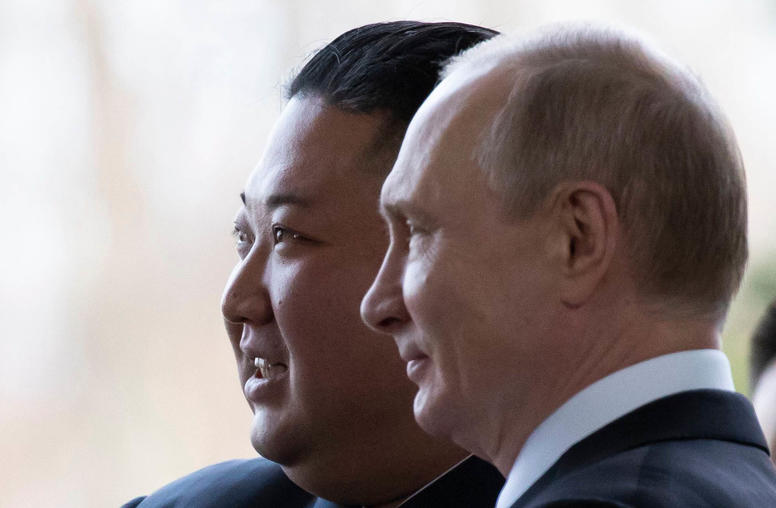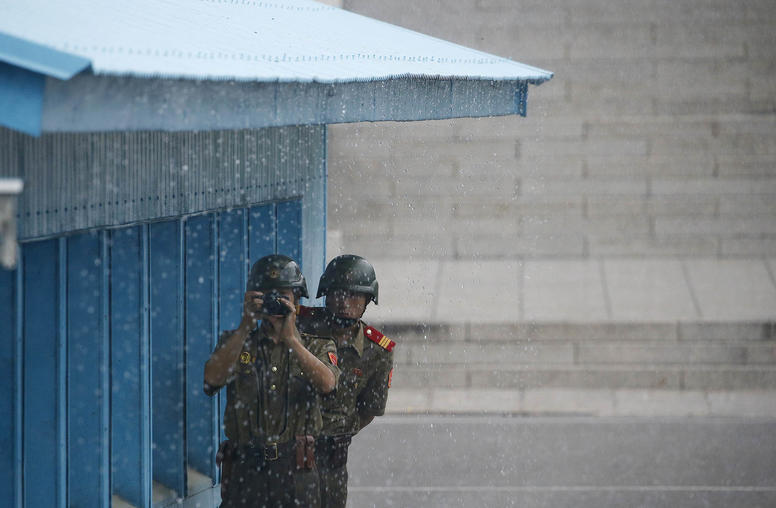Frank Aum on the Year in North Korea Diplomacy
With North Korea’s self-imposed, year-end deadline for a nuclear deal looming, USIP’s Frank Aum says that while complete denuclearization isn’t likely in the near term, “all of the components of a good-enough interim nuclear deal are there, but both sides need to be flexible on some of the harder issues.”
On Peace is a weekly podcast sponsored by USIP and Sirius XM POTUS Ch. 124. Each week, USIP experts tackle the latest foreign policy issues from around the world.
Transcript
Tim Farley: As we reported the other day, North Korea has insulted President Trump— they called him a heedless and erratic old man. This after he had tweeted that leader Kim Jong Un would not want to abandon a special relationship between the two leaders and affect the American presidential election by resuming hostile acts.
Tim Farley: And much of this is following what had taken place with tests that North Korea has undertaken, seemingly, as part of a pressure campaign against the U.S. to come up with some kind of an agreement, perhaps by the end of the year. Let's try to make sense of it all with Frank Aum, who's a senior expert on North Korea, tweeting @USIP. He's with the United States Institute of Peace. Frank Aum, welcome back. Thank you for being here today. Frank Aum: Good to be here, Tim.
Tim Farley: It does sound like that Kim Jong Un is trying to get some kind of an agreement, but it also sounds quite familiar to those who have watched the U.S. and North Korea do this dance before. And that is that North Korea gets us up to the edge of agreeing to something and then backs off. What is your take on what is taking place here? Is it different from what we've seen playing out in the past?
Frank Aum: Well, you have to remember that since the failure in Hanoi back in February to reach a deal between the two sides, Kim Jong Un has created an artificial deadline for the U.S. to provide a more flexible offer, particularly related to sanctions relief, by the end of the year. So, we're about three weeks away from this end-of-the-year deadline.
Frank Aum: I think some of what you said is true about North Korea's brinkmanship, but what's very different about this time is that they engaged in an unprecedented level of their own pressure campaign against the U.S. to get the U.S. to offer a better deal. So, we've seen multiple statements from various North Korean agencies over the past couple months, as well as the ballistic missile test. So, I get a sense, a little bit, that there's a sense of desperation from North Korea right now to get a deal.
Tim Farley: I wonder, and this seems to be the case that President Trump undertakes foreign policy, like he does so many other things, on a personal level and he referred to a special relationship between himself and Kim Jong Un. Does Kim Jong Un, in your mind, view this as a special relationship that he has with President Trump?
Frank Aum: That may have been the case earlier this year. Certainly, there was the exchange of letters and the personal level of diplomacy through the three meetings, but I think over the last month, that relationship is starting to fall away, and we're starting to see a return to some of the personal insults that we saw in 2017 when we were at the height of tensions. So, as you mentioned before, things like calling President Trump an erratic old man, the return of the term “dotard.”
Frank Aum: And then, likewise, President Trump has also started to resurface the term “rocket man” that he used for Kim Jong Un back in 2017. Again, it's not as severe as it was, because there's a little nuance in how they use those terms. They didn't call them those terms directly, but it was more like, for example, President Trump said, "Chairman Kim likes to shoot off missiles. That's why I call him rocket man." Which isn't a direct affront, but we're starting to see those terms resurface.
Tim Farley: I wonder, Frank, give us a sense of whether or not, when you said desperation, what is it that's causing the desperation for Kim Jong Un? Why would he feel this pressure right now?
Frank Aum: So, I think we have to look at what happens if there is no deal. So, despite the fact that Kim Jong Un is saying that they're not in a situation of desperation and they can assume an alternative path, which is conducting additional provocations. They're not in a good position, because if there is no deal by the end of the year, then they have to do something. Otherwise they lose face in terms of setting this deadline and doing nothing. So, we expect that they can conduct or resume certain levels of provocations, like missile tests.
Frank Aum: But they have to be careful because, one, if it's to a higher level, for example, like a ICBM test or a nuclear test, then that could cause U.S. and Chinese retaliation, certainly in terms of additional UN sanctions. But also, at the moment, China has been supporting North Korea through nutritional assistance, through encouraging Chinese citizens to engage in tourism in North Korea, which brings in a lot of revenue for North Korea, and also not enforcing the current existing sanctions.
Frank Aum: So, all of that could go away if North Korea decides to take it too far. So, they don't want to be in a position next year where there's no deal, no sanctions relief, and they're boxed in and can't conduct too many provocations or a certain type of provocation. And that's a bad position for North Korea to be in.
Tim Farley: Frank Aum is with us. Frank is senior expert on North Korea at the United States Institute of Peace. What had been, seemingly, a discussion of the trilateral relationship among the U.S., North Korea and China has now seemingly left China out. Where are they in all of this?
Frank Aum: Well, that's a good question. So, China certainly wants to see reduction of tensions on the peninsula and greater peace and stability. At the same time, what they've done is try to put the burden on the U.S. to reach a deal with North Korea and say that the hands are off on this.
Frank Aum: At the same time, China has a lot of leverage with North Korea. Over 90% of North Korea's trade goes through China. And as I mentioned before, they've been doing a lot to relieve the pressure on North Korea to reduce the potential for instability there. At the same time, we can't outsource a solution to China. We can try to get them to enforce the sanctions, increase pressure on North Korea. At the same time, really what the North Koreans are looking for is a reduction in the so-called hostile policy from the U.S., and that's only something that the U.S. can provide.
Tim Farley: And finally, is the only position that should be acceptable to the United States the denuclearization of North Korea and the peninsula?
Frank Aum: Well, that's a debate that's ongoing right now within the North Korea policy circles here in D.C. So, right now the intelligence community assesses that North Korea will not give up its nuclear weapons unless it's in a position where they feel like holding onto their weapons will threaten the security and survival of the regime.
Frank Aum: So, if we think that North Korea is not going to give up their weapons, and certainly not complete denuclearization in the near term, then what steps can we take to still improve security and reduce tensions? And so, there's steps that we can take that may not go completely to full denuclearization, but could still enhance security. So, for example, reaching some sort of interim agreement that would put a freeze on North Korea's nuclear and ballistic missile activities. It doesn't get us to complete denuclearization, but it's a good first step.
Tim Farley: Is that step up to President Trump to take or is the next step up to Kim Jong Un?
Frank Aum: It's up to both, because in a negotiation, it's a give and take and both sides need to feel like they've received a sufficient proportional level of incentives, right? So, I think both sides need to demonstrate flexibility. Certainly President Trump in terms of sanctions release, and at the same time also in terms of what you're asking for from North Korea. So, not complete denuclearization up front, but just a freeze on their ballistic missile and nuclear activities. And then in turn, North Korea, instead of demanding complete relief from all the major sanctions since 2016, maybe accepting just sanctions in certain sectors. So, I think all the components of a good enough interim nuclear deal is there, but both sides need to be flexible on some of the harder issues.
Tim Farley: I appreciate your being with us, Frank. Thanks so much for being on POTUS today.
Frank Aum: Thank you.
Tim Farley: Frank Aum, senior expert on North Korea with the United States Institute of Peace. His thoughts on the latest back and forth between the U.S. and North Korea, mostly between President Trump and Kim Jong Un. The Twitter handle is @USIP.



